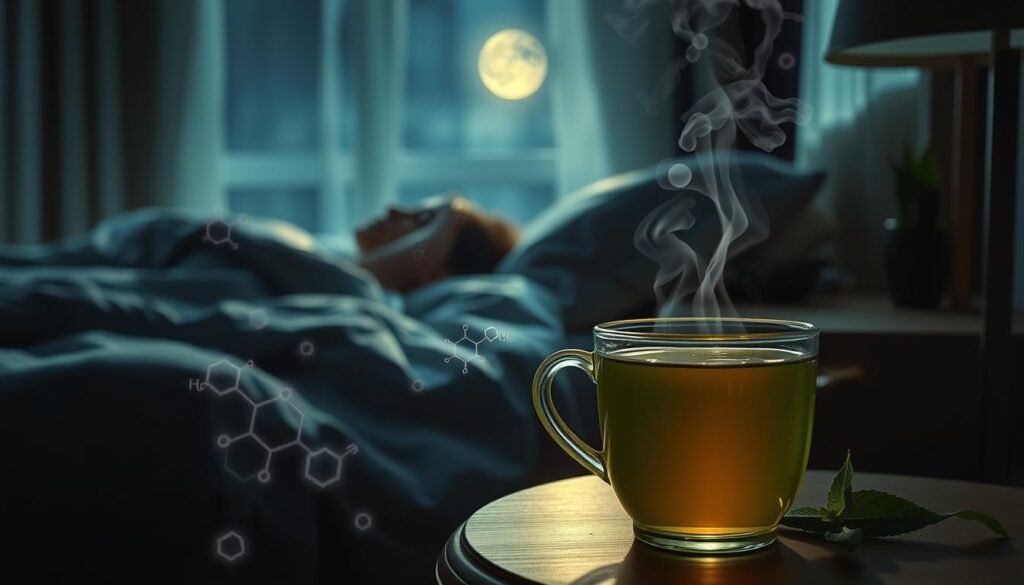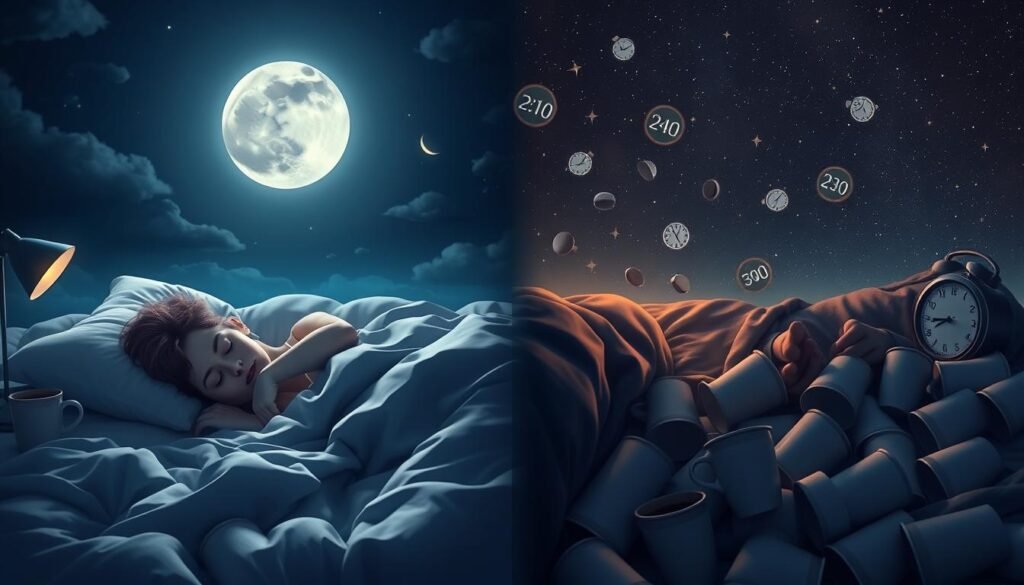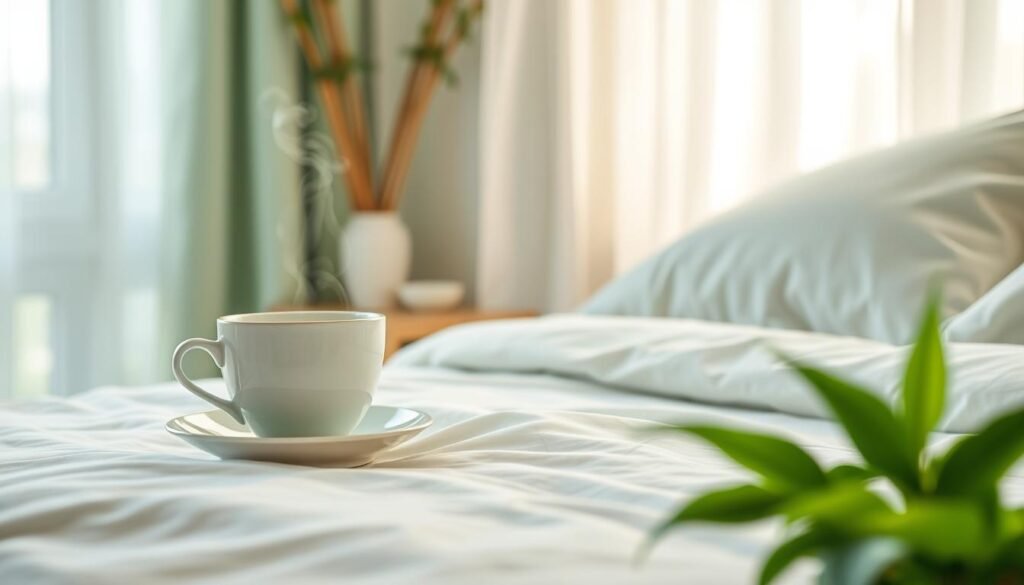Amazingly, about 88% of people who drink caffeine in the afternoon have at least one sleep problem. This shows how caffeine can really affect sleep quality. It is important to know how caffeine and other substances in green tea can mess with sleep. Green tea comes from the Camellia sinensis plant. It is known for its antioxidants and health benefits. But, it also has caffeine levels that can affect our nighttime rest.
Caffeine can cut down on deep, slow-wave sleep. So, it’s key for us to watch how much green tea we drink and when we drink it. Green tea has L-theanine, which helps us relax. However, its mix with caffeine can cause different effects on how well we sleep. We will look into how to balance enjoying green tea’s health perks while limiting its sleep disturbances.
Key Takeaways
- About 88% of caffeine consumers have reported sleep issues.
- Green tea contains varying caffeine levels that can impact sleep.
- Deep, slow-wave sleep can be reduced by caffeine consumption.
- L-theanine in green tea may help promote relaxation.
- Understanding individual tolerance to caffeine is vital for sleep quality.
- Timing of green tea consumption is essential to minimize sleep disruption.
Introduction to Green Tea and Its Compounds
Green tea is famous for its health perks. It has been used for ages. Its compounds make it loved worldwide.
Catechins like EGCG are strong antioxidants. They fight oxidative stress and boost heart health and metabolism.
Green tea has less caffeine compared to coffee. A cup has about 30 mg of caffeine. Even so, it can still keep you alert.
L-theanine, a green tea amino acid, helps with focus and relaxation. It works well with caffeine for better mental performance without nervousness.
The mix of green tea’s compounds greatly benefits health. They improve wellness and sleep. But, drink it at the right time to avoid sleep issues.
| Green Tea Compounds | Health Benefits |
|---|---|
| Catechins (EGCG) | Antioxidant properties, reduced cardiovascular risk |
| Caffeine | Increased alertness, improved focus |
| L-theanine | Enhanced relaxation, stress reduction |
The Role of Caffeine and Other Compounds in Green Tea Disrupting Sleep
Green tea is full of compounds, and caffeine is a key player. It wakes up the brain, making it hard to sleep. Even though green tea has less caffeine than coffee, it still affects people who are sensitive to caffeine. Drinking green tea before bed might make it hard for them to fall asleep.
Caffeine can make it take longer to fall asleep and keep you awake. A study found that a certain amount of green tea kept people awake for three hours. So, even a little green tea can have a big effect on sleep. It wakes you up in a way similar to coffee but without needing to drink it often.
L-theanine in green tea can also affect sleep. It may help you relax which might offset the wakeful effects of caffeine. This shows the relationship between green tea and sleep is complex. It involves both stimulating and calming effects working together.
It’s important to understand how green tea affects sleep. Watching how much caffeine you have, especially at night, is key. More research is needed to better know how it affects our sleep. This is especially true as more people drink tea. Knowing about its effects, including how it can disrupt sleep, is getting more important.
For more insights on the health benefits of green tea, visit this resource.
Understanding Caffeine: The Stimulant in Green Tea
Caffeine is a key component in green tea that impacts many body functions, including how well we sleep. How a person reacts to green tea varies with their caffeine tolerance. This section looks at caffeine’s role in our bodies and compares it to coffee’s caffeine content.
How Caffeine Works in the Body
Caffeine keeps us awake by blocking certain receptors in our brains. This action makes us feel more alert and less tired. However, it can disrupt sleep patterns for some people. The caffeine in green tea can boost metabolism, increasing energy and reducing fatigue. Yet, for those sensitive to caffeine, even green tea’s moderate levels can disturb their sleep.
Comparative Caffeine Content in Green Tea vs. Coffee
Green tea has about 30 mg of caffeine per 8-ounce cup, much less than coffee’s 95 mg for the same size. This information is key for people watching their caffeine intake. Here’s a table showing how much caffeine is in different drinks:
| Beverage | Caffeine Content (mg per 8 oz) |
|---|---|
| Espresso | 240–720 |
| Coffee | 102–200 |
| Yerba mate | 65–130 |
| Energy drinks | 50–160 |
| Brewed tea (including green tea) | 40–120 |
| Soft drinks | 20–40 |
| Decaffeinated coffee | 3–12 |
| Cocoa beverage | 2–7 |
The Impact of Green Tea Compounds on Sleep Quality
Green tea is known for its impact on sleep quality. L-Theanine, a compound in green tea, is especially noted for its calm-inducing abilities. Found in matcha, it can lessen stress and help bring about a relaxed state. This may lead to better sleep.
Role of L-Theanine in Promoting Relaxation
L-Theanine brings on a peaceful state without making you feel sleepy. It balances out the stimulant effect of caffeine. By improving focus and avoiding jitteriness, it’s great for daytime green tea drinkers. Regular consumption may boost sleep quality, especially for those with anxiety. Adding L-Theanine to your routine can help balance sleep and wakefulness, even with caffeine.
Antioxidant Properties of Green Tea and Sleep
Green tea’s catechins, like EGCG, are strong antioxidants. They fight inflammation and help protect the brain, which may improve sleep quality. The antioxidants may help prevent diseases that affect the brain as we get older. Drinking green tea regularly might enhance brain function and sleep, benefiting mental health and rest.
Insomnia and Green Tea Consumption
Studies suggest green tea impacts sleep. It’s key to know how green tea consumption affects sleep. Some research says drinking green tea during the day can improve sleep and reduce tiredness. But, drinking it before sleeping might make insomnia worse because of the caffeine.
Research on Green Tea’s Effect on Insomnia Symptoms
Research shows a link between green tea compounds and insomnia. Drinking green tea regularly might improve sleep quality. During stressful times, like the COVID-19 pandemic, people who drank tea longer slept better. This suggests green tea may help with sleep despite its caffeine. For more details, check this research article.
Balancing Green Tea Intake with Sleep Patterns
It’s important to find a good balance with green tea consumption for good sleep. Drinking it moderately is good, but reduce it before bedtime. Knowing how caffeine affects you is important. The relationship between green tea and sleep is complex and needs careful thought.
| Variable | Correlation with Sleep Quality |
|---|---|
| Frequency of Green Tea Consumption | r = -0.107 |
| Type of Green Tea | r = -0.105 |
| Years of Consumption | r = -0.102 |
| Concentration of Tea Consumption | r = -0.098 |
Caffeine Effects on Sleep: What the Studies Show
Studies on caffeine and sleep show different results. Small doses of caffeine can disrupt sleep if taken late in the day. This can lead to increased time to fall asleep and less overall sleep.
Caffeine starts affecting the body quickly, within 20 to 30 minutes after drinking it. Its half-life ranges from 3 to 5 hours but varies from person to person. Smokers may process caffeine faster than pregnant people, who might feel its effects longer.
Timing is critical when it comes to caffeine intake. To avoid sleep problems, don’t consume caffeine eight hours before going to bed. Drinking caffeine six hours before sleep can cut sleep time by one hour.
About 88% of people drinking caffeine in the afternoon face sleep issues. It’s important to watch how much caffeine you consume, especially from green tea.

| Source | Caffeine Content (mg) | Sleep Impact |
|---|---|---|
| Coffee (8 oz) | 100 – 200 | Can disrupt sleep if consumed late |
| Green Tea (8 oz) | 40 – 120 | May impact sleep; moderation suggested |
| Energy Drinks (8-16 oz) | 50 – 300 | Significantly affects sleep duration |
| Soda (12 oz) | 0 – 70 | Potentially disrupts sleep based on content |
It’s important to know how all the caffeine you drink affects your sleep. By understanding this, you can make better choices and improve your sleep. For sleep troubles, consider alternatives like cannabis, which may help. To learn more, visit the best marijuana strain for insomnia.
Nighttime Urination: The Diuretic Effect of Green Tea
Green tea is famous for its health benefits. However, it can disrupt sleep because it’s a natural diuretic. Drinking it before bed can make you get up more often to pee. This means you won’t sleep as well as you should.
Understanding Fluid Intake Before Bedtime
How much you drink before bed affects how often you pee at night. Drinking green tea in the evening can interrupt your sleep. It has caffeine, which makes you urinate more. So, you might find yourself going to the bathroom a lot if you drink it before sleeping.
Studies show people who drink green tea two hours before bed face more sleep problems.
Below is a table illustrating the relationship between green tea consumption and its potential impact on sleep quality:
| Green Tea Intake Timing | Impact on Sleep | Nighttime Urination Frequency |
|---|---|---|
| More than 2 hours before bedtime | Minimal impact | Low |
| 1-2 hours before bedtime | Mild disruption | Moderate |
| Less than 1 hour before bedtime | High disruption | High |
Knowing when to drink green tea is key to less nighttime peeing. By choosing the right time to drink it, you can sleep better. This way, green tea won’t disrupt your rest as much.
How Individual Sensitivity to Caffeine Affects Sleep
Understanding how caffeine affects sleep is key for managing your coffee intake. People react to caffeine differently, mainly due to genetics. Some may drink coffee late and still sleep well. Others might find even a small cup can keep them awake.
It’s important to know how fast your body processes caffeine. This can help you decide when to stop drinking it. So, if you know caffeine disrupts your sleep, watching your intake is wise.
Genetic Factors Influencing Caffeine Metabolism
Studies show that genes play a big role in caffeine sensitivity and its effect on sleep. The CYP1A2 gene affects how you metabolize caffeine. For example, a study with over 1,200 older adults found that caffeine impacted sleep differently among genders.
Older women not drinking caffeine faced more sleep issues than those who did. But, older men didn’t show the same trend. This highlights how genes and gender influence caffeine’s impact on our sleep.
Considering most adults enjoy caffeine, it’s important to understand its effects on rest. Caffeine can last up to eight hours in the body, so timing is crucial. Knowing how caffeine affects you can help improve not just sleep but overall health.

Green Tea: Timing and Sleep Disruption
The time you drink green tea matters for your sleep. Have it several hours before bed to enjoy its health perks without risking your sleep. Sipping it right before bed could make falling asleep tough. This is due to its caffeine and its effect to make you pee more.
The caffeine in green tea starts to act as soon as 20 minutes after you drink it. This can make it hard to sleep in the next hour. Also, green tea makes you go to the bathroom more at night. This can wake you up often. A study found that green tea with less caffeine (LCGT) doesn’t disrupt sleep as much as regular green tea (SGT).
To keep your sleep peaceful, don’t drink green tea two hours before bed. This helps ensure you get the benefits of green tea without sacrificing sleep. For more details on how green tea affects sleep, check out this article.
The link between when you drink green tea and sleep quality is worth knowing. By timing your green tea intake wisely, you can enjoy it while still getting good sleep. This way, you make smart choices for your daily habits.
Potential Benefits of Green Tea for Sleep
Green tea has many properties that can help improve sleep quality. It has caffeine and diuretic effects, but it also contains L-theanine. This amino acid helps you relax and wind down at the end of the day.
Drinking green tea regularly might improve how your brain works and help with sleep-related issues. Studies show that green tea extract (GTE) and epigallocatechin-3-gallate (EGCG) can restore brain functions affected by lack of sleep. For example, taking GTE at 200 mg/kg/day and EGCG at 50 mg/kg/day can bring spatial memory back to normal after not sleeping.
EGCG in green tea has antioxidant properties. It fights oxidative stress and supports brain health. It helps keep total thiol levels normal, an important antioxidant during sleep deprivation.
Adding green tea to your daily habits can bring many health benefits, including better sleep. People who drink it often have a lower chance of losing brain function as they get older. One study showed a 64% decrease in cognitive impairment risk in adults.
Enjoying green tea’s benefits while avoiding its downsides is easy. Just drink it earlier in the day. This way, it can help you sleep better without any negative effects.

| Benefit | Details |
|---|---|
| Improved Sleep Quality | L-theanine promotes relaxation. |
| Cognitive Function | EGCG supports memory restoration after sleep deprivation. |
| Antioxidant Protection | Green tea helps normalize antioxidant levels. |
| Reduced Risk of Cognitive Decline | Linked to a 64% lower chance of impairment. |
| Mindful Consumption | Drink earlier in the day for maximum benefits. |
Conclusion
Green tea has a complex relationship with sleep. It is known for being healthy, but it affects sleep in different ways. L-theanine in green tea helps with relaxation and may make sleep better. This is especially true for green tea with less caffeine. Studies suggest that people drinking green tea with less caffeine felt less tired and slept better.
But, how caffeine affects you is important. Green tea has caffeine, which may make you more alert and disturb your sleep if you drink it late. So, it’s important to know how green tea impacts you. Choosing green tea with less caffeine might help if you want its calming effects without feeling too awake.
To fully benefit from green tea while sleeping well, watch when and how much you drink it. By controlling your green tea intake, you can enjoy its health advantages and still sleep well.